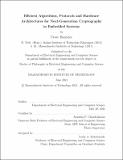Efficient Algorithms, Protocols and Hardware Architectures for Next-Generation Cryptography in Embedded Systems
Author(s)
Banerjee, Utsav
DownloadThesis PDF (17.27Mb)
Advisor
Chandrakasan, Anantha P.
Terms of use
Metadata
Show full item recordAbstract
The Internet of Things (IoT) consists of an ever-growing network of wireless-connected electronic devices which are always collecting, processing and communicating data. While the IoT has inspired many new applications, these embedded devices have unique security challenges, thus making IoT security a major concern. Security architectures for IoT devices, both software and hardware, must be low-power and have low energy consumption, while still providing strong cryptographic guarantees and side-channel resilience. Network security protocols use a variety of cryptographic algorithms to achieve these goals. However, the associated computational complexity makes it extremely important to have low-power and energy-efficient embedded implementations of cryptography, especially public key algorithms.
The research presented in this thesis demonstrates the design, implementation and experimental validation of efficient next-generation cryptography for embedded systems using software optimization, hardware acceleration and software-hardware co-design, along with side-channel countermeasures. Using circuit, architecture and algorithm techniques, efficient hardware-accelerated implementations of elliptic curve cryptography, pairing-based cryptography, lattice-based cryptography and other post-quantum cryptography algorithms are demonstrated with up to two orders of magnitude energy savings compared to state-of-the-art software and hardware. These configurable hardware accelerators are further coupled with a low-power micro-processor to provide the flexibility to implement a wide variety of security protocols, thus enabling strong and affordable security for energy-limited IoT nodes.
Date issued
2021-06Department
Massachusetts Institute of Technology. Department of Electrical Engineering and Computer SciencePublisher
Massachusetts Institute of Technology